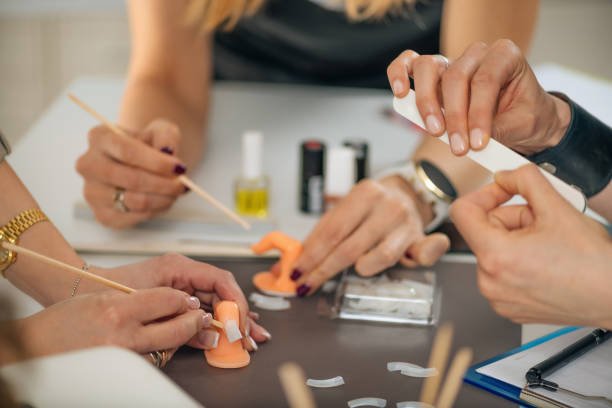The beauty industry has witnessed a remarkable surge in popularity over the past few years. With nail art and design becoming a fashion statement of its own, there’s a growing demand for talented nail technicians who can turn ordinary nails into miniature works of art. If you’re an enthusiast looking to turn your passion for nail care and nail art into a rewarding career, nail technician courses might be the ideal path for you. In this article, we will explore the world of nail technician courses, from the basics to the advanced, and why they are a fantastic option for those eager to get hands-on in the beauty industry.
The Nail Technician’s Role
Before delving into the world of nail technician courses, it’s essential to understand what the role entails. Nail technicians are professionals who specialize in providing nail care services, including manicures, pedicures, and nail enhancements. Their skills go beyond basic nail grooming; they create intricate nail art, apply nail extensions, and are experts in nail health and hygiene.
Nail technicians play a crucial role in helping clients maintain healthy and beautiful nails. As a nail technician, you’ll interact with a diverse clientele, from those who want a classic French manicure to individuals seeking eye-catching, elaborate nail designs.
The Growing Popularity of Nail Art
The rise of nail art as a popular form of self-expression has taken the beauty industry by storm. Social media platforms like Instagram and Pinterest are flooded with mesmerizing nail designs that showcase the creativity and artistry of nail technicians worldwide. As people increasingly view their nails as a canvas for artistic expression, the demand for skilled nail technicians continues to soar.
The pandemic has further fueled this trend, as more people have started experimenting with DIY nail art at home. This newfound interest in nail care and design has not only driven a surge in nail product sales but also increased the need for professional nail technicians to provide expert services.
Choosing the Right Nail Technician Course
If you’re eager to become a nail technician and turn your passion into a fulfilling career, you’ll need the right education and training. There are numerous nail technician courses available to help you build the skills and knowledge required to excel in the industry. Here are some key factors to consider when choosing the right course:
- Accreditation: Ensure that the course is accredited by a recognized beauty school or organization. Accreditation is a hallmark of quality education and can greatly affect your future job prospects.
- Curriculum: Look for courses that offer a comprehensive curriculum covering nail care, nail art, nail enhancements, sanitation, and customer service. A well-rounded education will prepare you for all aspects of the job.
- Hands-On Training: Nail art is a hands-on profession, so make sure the course provides ample opportunities for practical experience. Practical training is crucial for building your skills and confidence.
- Instructors: Experienced instructors can make a significant difference in the quality of education. Research the qualifications and experience of the instructors to ensure they can provide you with the guidance you need.
- Facilities: Check if the school or training center has the necessary equipment and materials for hands-on training. A well-equipped facility will enhance your learning experience.
- Cost: Nail technician courses vary in cost, so consider your budget and look for courses that provide the best value for your investment.
The Phases of Nail Technician Courses
Nail technician courses are typically divided into different phases, each designed to build on your skills and knowledge progressively. Here is an overview of the common phases you can expect to encounter in a nail technician course:
- Basic Nail Care: This phase covers the fundamentals of nail care, including nail anatomy, sanitation, and basic manicure and pedicure techniques. You’ll learn how to properly shape, trim, and care for natural nails.
- Nail Art: In this phase, you’ll delve into the creative side of nail technology. You’ll learn various nail art techniques, including nail painting, nail design, and nail embellishments. Nail art is where your artistic talents can truly shine.
- Nail Enhancements: Nail enhancements involve techniques like acrylic nails, gel nails, and nail extensions. You’ll learn how to apply and maintain these enhancements, as well as how to address common issues and perform repairs.
- Salon Management: Some courses offer a salon management phase that covers business aspects, customer service, and the legal and ethical considerations of the industry. This phase is essential if you plan to operate your own nail salon.
- Advanced Techniques: For those looking to specialize, advanced courses may be available. These can cover specialized nail art techniques, unique nail enhancements, and the latest trends in the industry.
Career Opportunities for Nail Technicians
Once you’ve completed your nail technician course and obtained your license, a world of career opportunities awaits you. Nail technicians can find work in a variety of settings, including nail salons, spas, beauty centers, and even cruise ships. If you’re entrepreneurial, you can start your own nail salon or offer mobile nail services.
The demand for skilled nail technicians is expected to continue growing, offering job security and numerous opportunities for career advancement. Some experienced nail technicians even become industry influencers, educators, or consultants, sharing their expertise with others.
The Importance of Hands-On Experience
While theoretical knowledge is essential, the nail technician profession is primarily about hands-on skills. This is where the true magic of nail art and design happens. Practical experience not only allows you to hone your craft but also helps you build a portfolio of work that can attract clients and job opportunities.
Hands-on experience includes practicing different nail techniques, creating nail art designs, and working on real clients under the guidance of experienced instructors. This direct interaction with clients helps you develop essential communication and customer service skills, which are vital in the beauty industry.
Nail Technician Certification and Licensing
In most regions, nail technicians are required to obtain a license to practice professionally. The specific licensing requirements can vary from one location to another, but they generally involve completing an accredited nail technician course, passing a licensing exam, and meeting certain educational and practical hour requirements.
The licensing process ensures that nail technicians have the necessary skills and knowledge to provide safe and high-quality nail care services to clients. It also provides clients with confidence that they are receiving services from a qualified professional.
Continuing Education and Staying Updated
The beauty industry is constantly evolving, with new nail care techniques and products emerging regularly. To stay competitive and meet the demands of your clients, it’s crucial to engage in continuous learning and professional development. Many nail technicians choose to take advanced courses, attend workshops, and participate in industry events to stay updated on the latest trends and innovations.
In addition to expanding your technical skills, continuing education can also help you build a strong client base and establish a reputation as a knowledgeable and skilled nail technician.
Conclusion
Nail technician courses offer an exciting opportunity for nail care enthusiasts to turn their passion into a fulfilling and lucrative career. As the demand for nail care and nail art continues to grow, skilled nail technicians are in high demand, making this profession a promising one for those who are willing to invest in their education and training.
Choosing the right nail technician course is crucial, as it can significantly impact your future success in the industry. Look for accredited programs that provide a comprehensive education with hands-on training and experienced instructors. With dedication, continuous learning, and a creative touch, you can build a successful career in the world of nail technology, where every set of nails becomes



